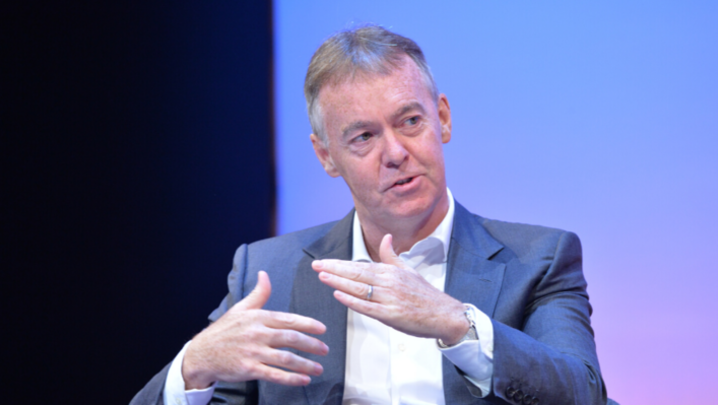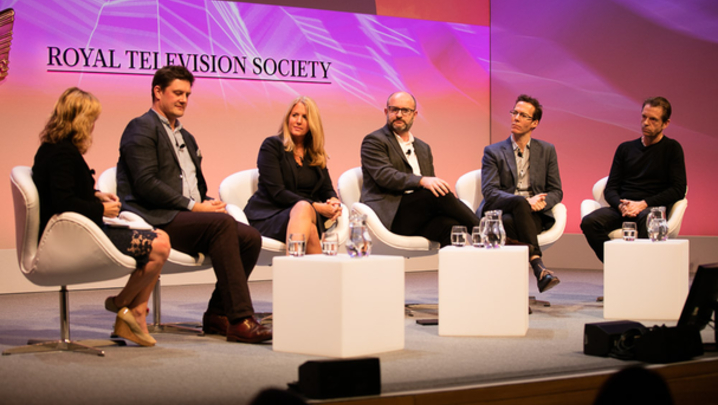Stuart Kemp digs behind the glitz to discover the genesis of Sky Atlantic’s Côte d’Azur saga, Riviera
What would Dallas look like made by Sky Atlantic? This was the question pondered during a brainstorming session for new drama ideas back in 2015, attended by Zai Bennett, director of Sky Atlantic, Sky’s head of drama, Anne Mensah, and commissioning editor Cameron Roach.
“We were worried that our overall tone and style were a bit too visceral, with a lot of shows that were violent and grown-up,” explains Bennett. He highlights Game of Thrones, Banshee and Fortitude – “quite an extreme horror show,” as he cheerfully puts it.
The team wanted to find a show possessing all the hallmarks of cinematic event TV with which Sky Atlantic is identified that was, simply, more fun.
“We were looking for something that could be smart and serialised and all the things that Sky Atlantic is,” Bennett says. “It had to have those [Sky Atlantic] values of being engaging, challenging and interesting – but be a bit sexier and pacy.”
The answer is Riviera, a 10-part original drama series that started airing on Sky Atlantic in mid-June. Set in the opulent playground of the sun-drenched South of France, Riviera stars US actor Julia Stiles as an intelligent, resourceful billionaire’s wife.
“Netflix only bangs on about things that have worked, likewise Amazon.”
Her immaculate life is blown apart when her art-collector husband is killed in an explosion aboard the yacht of an arms-dealing Russian oligarch. As Stiles’s character navigates the fallout from his death, the drama reveals seedy, often criminal, activities occurring beneath the glossy surface of her, apparently perfect, Côte d’Azur life.
Adrian Lester, Lena Olin and Iwan Rheon co-star. The Riviera on screen now is very different to the show’s beginnings. It started life when former U2 manager Paul McGuinness brought Oscar-winning writer and director Neil Jordan an outline idea and introduced him to Liza Marshall and Kris Thykier of Archery Pictures.
Jordan told McGuinness and Archery that he’d get involved if he could come up with his own original narrative for a show set on the French Riviera.
Jordan, whose film credits include The Crying Game, Interview With the Vampire and Byzantium, had previously created the historical drama The Borgias for Showtime Networks. He directed six episodes and either wrote or co-wrote all the episodes.
“I wrote the story and, subsequently, the ‘bible’ of [Riviera’s central] Clios family and estate, and the two wives, one new, who has to uncover her husband’s financial secrets after his death,” Jordan says.
He then wrote several scripts with his friend the Booker prize-winning author John Banville (The Sea), for what was meant to be the first two episodes.
Their efforts elicited the interest of Sky Atlantic. Very close to the beginning of production, Jordan was presented with shooting scripts for the pilot and second episode. Jordan opted not to direct any episodes, including the pilot.
This was for various reasons, but “mainly differences with the producers over the tone and content of the scripts”, he explains.
His original scripts were darker in tone, “more Patricia Highsmith, less sunny soap opera”.
Instead, Jordan chose German filmmaker Philipp Kadelbach, who had recently made the English-language SS-GB, to direct the pilot before taking a back seat. And, thereby, distanced himself from what was now a very different Riviera to the show that he co-created.
Jordan emphasises that Sky had “behaved very well throughout” and brokered peace during those days of heated arguments over the show’s creative direction. Hans Herbots, Paul Walker and Damon Thomas directed the later episodes.
Sky Atlantic brought in Foz Allan of Canterbury-based Bryncoed Productions – best known for the RTS award-winning children’s series The Dumping Ground and big-budget drama Jekyll and Hyde – to produce the show.
Allan provided an established and safe pair of hands for Rivieria as the production assembled with Kadelbach as lead director and the Bafta-winning Laurie Rose as director of photography.
During the summer of 2016, the show filmed for 128 days across 14 months on location on the French Riviera at some of the most exclusive and expensive places on earth.
The budget is reportedly over £2m per hour. “It’s a very expensive show, a very expensive place to film and it’s a fixed market,” says Allan. “No amount of cash is going to persuade a Saudi prince or a Russian oligarch to move out of the way for the filming.”
Shooting in France with a majority French crew and 35-hour working-week regulations, coupled with Screen Actors Guild regulations such as portal-to-portal travel-time contracts for some of the cast, added to the show’s cost and production time.
One of the most challenging (and expensive) parts of the shoot came when the script called for a blow-out, dusk-till-dawn party on a Russian oligarch’s super yacht in the Bay of Monaco.
The film-makers hired a €25m boat from a friendly Glaswegian multi-millionaire for a shoot lasting two days and nights. “That involved safety boats, divers in the water and a large-scale crew and cast,” Allan says. “Feeding 75 on the boat plus 30 support staff and crew out on the water was logistically challenging.”
There were also plenty of scantily clad extras playing partygoers being urged to keep their energy up and strut their stuff at 3:00am, despite being freezing cold and tired.
“You can’t blame anyone for being tired, grumpy and cross at that stage,” Allan laughs. “My skill is that I understand the narrative drive and where the money has to go to make the story work.” As with other Sky Atlantic original commissions, including the second seasons of Fortitude and The Tunnel, the subscription channel has opted to make the entire series available to its customers all at once.
“Sky Atlantic is all about delivering value to customers, it is not about filling a slot or hitting a rating,” explains Bennett. “It’s about customers thinking, ‘I really like that channel or that show, I’m going to keep subscribing to Sky’. Any show that has a moreish quality, you’re going to want to burn through.
“On-demand has completely changed how people consume things. If people are subscribing all year round you have to give them value all year round.
“The traditional terrestrial TV rules about looking at scheduling just don’t really apply to Sky Atlantic. Those ways are applying less and less to [terrestrial broadcasters] as well, but they really don’t apply to us.”
With Riviera, Sky Atlantic is firmly putting down a marker in its contest with Amazon and Netflix for kudos and profile in the highly competitive original drama field.
“It’s not just the money we spend, it’s the editorial ambition, it’s the creative idea,” insists Bennett. “The difference between us and Netflix and Amazon is that we are far more publicly set up – so our successes and our failures are more public.
“Netflix only bangs on about things that have worked, likewise Amazon.”
Riviera premiered at Mip-TV in April to positive reviews. Ahead of the broadcast date, Bennett couldn’t confirm whether it would be recommissioned.
“I think the show stands up brilliantly and I’d like there to be a second season but I’m not able to confirm that just yet,” he says.
The skyscrapers may have been replaced by super yachts, and the oil by Kalashnikovs, but Sky Atlantic is confident that Riviera offers the same compelling mix of glitzy fun and intrigue that Dallas did so well 40 years ago.




